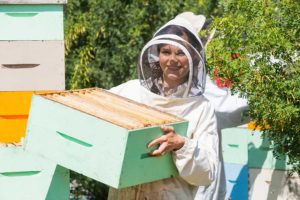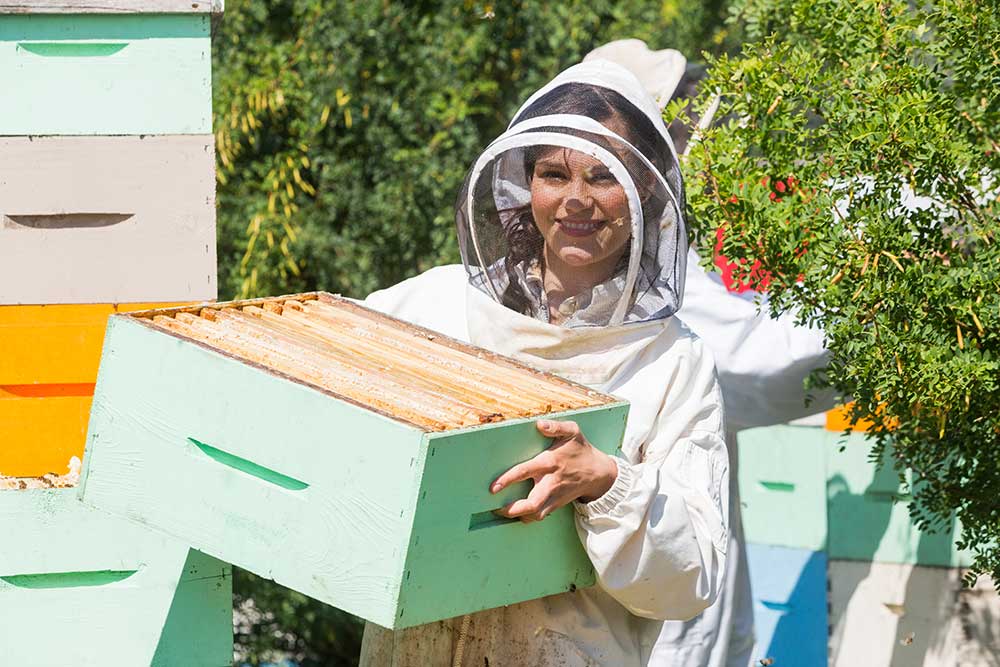Disclaimer: The information on our website is provided for general information purposes only. We make no representations or warranties of any kind, express or implied, about the completeness, accuracy, reliability, suitability or availability with respect to the website or the information contained on our website for any purpose. Any reliance on such information is therefore strictly at your own risk and we are not liable for any damages or losses arising out of or resulting from your reliance on any information contained on our website.
Beekeeping is caring for and managing a colony of bees and the production of their products: honey and beeswax. Beekeeping can be a profession or a hobby. A beekeeper can maintain the bees for its personal use of products, or it can be done as a profession on a larger scale. A professional beekeeper can also become a researcher or a conservationist.
How to Become a Bee Keeper

If you are interested in becoming a beekeeper, there are several ways to learn about the profession. Local associations and clubs are a great resource, since methods for beekeeping can vary based on the climate where you live. They can provide support, information, and some even provide free classes. One of the best ways to become more knowledgeable is to find a local experienced beekeeper who would be willing to mentor you. They can provide invaluable information that is specific to your community. Research your area to find out about local bee clubs. You can join a local bee club and/or the American Beekeeping Federation. State or county agriculture departments are also a resource to provide information on beekeeping.
Many colleges and universities across the country offer beekeeping research programs, clubs, or classes through the agricultural or entomology departments. However, these programs may not result a bachelors or masters degree specific to beekeeping. Some universities offer a Master Craftsman Beekeeper course program, which can last for several years.
For example, the University of Florida has a Florida Master Beekeeper Program (link opens in a new window) and the minimum age requirement is twelve. It has four levels, each lasting one year, with and the Master class requiring two years to complete, for a total of five years. They also have a Honey Bee Research and Extension Laboratory and their mission statement includes the goal that by, “conducting basic and applied research projects on bees, communicating our findings to assorted clientele groups through diverse extension programming, training future generations of bee educators, researchers, conservationists, and more.” Several other universities have programs and Beekeeping Institutes similar to this one.
What is Beekeeping
Bees are the only insect that produces food consumed by man. They are an essential part of pollinating plants which helps provide healthy food for the world. Each bee makes only 1/12th of a teaspoon of honey over its lifetime. Going into the field of beekeeping, one can keep bees to provide honey for personal use, make enough to sell at local business and farmers’ markets, producing honey and bee products on larger scale, or research and conservation.
Beekeeping is a seasonally driven profession. Summertime is the busiest time for beekeepers. Each hive should be checked weekly according to the Delaware Beekeepers Association’s The Newsy Bee (opens in a new tab), “to prevent swarming, and to add additional honey supers.” For a practiced beekeeper, this should only take a few minutes.
The workload significantly decreases in the winter, where there is little to do but occasionally check the bee hives for damage and ensuring that the hive entrances are clear of snow. When natural food sources are not available to the bees and flowers are not in bloom, the beekeeper will need to feed the bees sugar water. The proportion of water to sugar depends on your climate and the season.
How to Get Started as a Beekeeper
To get started as a beekeeper, you can purchase a beginner kit from a bee supply house. These kits will have all of the equipment needed for the hive. These wooden beehives, can range in costs from $215 to $300. Once you purchase the hive, you will need a veil and gloves, at about $25. You can elect to have a full bee suit for approximately $100. You will also need a smoker and a hive tool.
The amount of honey you receive from a hive can vary from an average of 50-200 pounds, depending on the climate where you live. The most essential part of your hives is the bees themselves. They can be caught in the wild, bought by local bee producers, or even purchased through the mail. Once the honey is ready, the beekeeper can extract the honey and other products. This can be done by hand, cutting the honey out in the comb chunks with a knife, or scrape the caps off of the cells and spin the liquid honey out in a centrifuge called a honey extractor.
If you elect to use the honey extractor, this will be at least an additional cost of $375. If you plan on keeping the bees on your residential property, make sure to research local laws and rules for your neighborhood. Also, if you or someone in your home has an allergy to bees, consult your doctor before pursuing beekeeping as a career or hobby.
Benefits of Beekeeping
Now you have the information needed to get you started in beekeeping. We want to share the benefits of working with bees after gathering information from others who do it. The main benefit we found was the pleasure of making honey! Beekeepers find it calming to work with bees and the satisfaction of making food that tastes yummy and visually appealing! Many find the health benefits worth mentioning as an alternative to eating granulated sugar. Many of our population are serious about healthier options to consume in their food, and honey is one of those chosen products. Beekeepers know there is a market for selling it and making an extra income! Who doesn’t want extra cash, right? We have all seen and often purchase honey from those roadside stands or farmers’ markets because of its benefits.
Beekeepers like to support their local community through their business and benefit from the connections they make. Beekeepers realize that bees are vital to the survival of most food on our planet! Bees are essential for pollinating our vegetable gardens, fruit trees, berry bushes, and other foods. The keeper of bees feels gratified to help improve our forest ecosystems by reintroducing bee populations where they have dwindled to alarming numbers. By increasing food quantities, not only do people benefit but also animals. People who keep bees also enjoy the seasonal work. Beekeeping is a spring and summer job with only occasional check-ups in the winter.
Article Citations
American Beekeeping Association. By Pat Stone. Beginning with Honeybees.
Delaware Beekeepers Association. The Newsy Bee. July 2008. Q&A: What it Takes to Get Started in Beekeeping.

